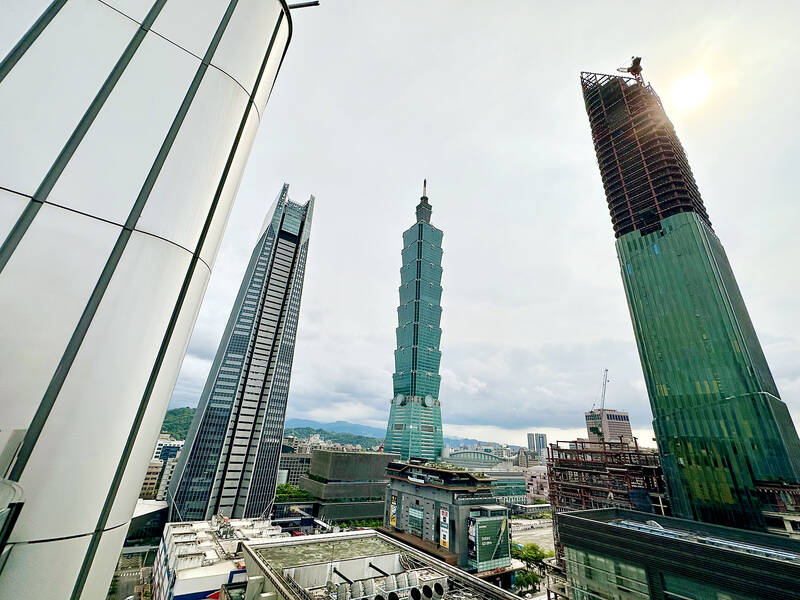The central bank’s new credit controls on second-home loans would have a very limited impact on the property market, as local banks generally adopt a cautious approach in dealing with mortgages in light of a weak economy, analysts said.
Moreover, most homeowners likely breathed a sigh of relief after the central bank on Thursday kept interest rates intact, as the previous five rate hikes have raised the mortgage burden to a 14-year high and cooled buying interest, Sinyi Realty Inc (信義房屋) said.
Mortgage rates have gained a cumulative 0.75 percentage points to 2.08 percent — rising above the 2 percent mark for the first time since January 2009 — implying an additional NT$70 billion (US$2.28 billion) in interest expenses as mortgages hit NT$9.4 trillion in April, Sinyi research manager Tseng Ching-der (曾敬德) said.

Photo: Hsu Yi-ping, Taipei Times
The pinch is especially evident for people who bought homes in the past three years, when housing prices spiked across Taiwan on the back of a robust economy and capacity expansions by major tech firms, Tseng said.
Property transactions started to soften in the second half of last year, dampened by interest rate hikes, an economic slowdown and unfavorable policy measures to curb property prices, he said.
Prospective buyers are likely to remain cautious after the central bank renewed credit controls by cutting the loan-to-value ratio from 75 to 70 percent on second-home mortgages in Taipei, New Taipei City, Taoyuan, Taichung, Tainan, Kaohsiung, and Hsinchu city and county, the analyst said.
The eight areas account for up to 80 percent of property transactions nationwide, he said.
The central bank aimed to send a message that “it cares” after putting policy rates on hold, in line with the US Federal Reserve, Tseng said.
Eastern Realty Co (東森房屋) said that the tighter lending terms, while unexpected, are reasonable as housing loans continue to rise despite shrinking transaction volumes.
In particular, second-home mortgages have grown unabated, the central bank said, adding that it is seeking to prevent funds from overflowing to real-estate properties and posing a threat to the financial system’s stability.
Eastern Realty said the lower loan-to-value cap would affect home buyers with relocation needs.
This group will have to set aside more money for down payments when switching houses, the broker said.
State-run Taiwan Cooperative Financial Holding Co (合庫金控) dismissed the worries, saying that lenders have by and large turned conservative about second-home mortgages.
Present loan-to-value ratios stand at 70 percent on average for second homes, the nation’s major mortgage lender said, adding that banks could show flexibility for people with relocation needs.

Taiwan Semiconductor Manufacturing Co (TSMC, 台積電) last week recorded an increase in the number of shareholders to the highest in almost eight months, despite its share price falling 3.38 percent from the previous week, Taiwan Stock Exchange data released on Saturday showed. As of Friday, TSMC had 1.88 million shareholders, the most since the week of April 25 and an increase of 31,870 from the previous week, the data showed. The number of shareholders jumped despite a drop of NT$50 (US$1.59), or 3.38 percent, in TSMC’s share price from a week earlier to NT$1,430, as investors took profits from their earlier gains

In a high-security Shenzhen laboratory, Chinese scientists have built what Washington has spent years trying to prevent: a prototype of a machine capable of producing the cutting-edge semiconductor chips that power artificial intelligence (AI), smartphones and weapons central to Western military dominance, Reuters has learned. Completed early this year and undergoing testing, the prototype fills nearly an entire factory floor. It was built by a team of former engineers from Dutch semiconductor giant ASML who reverse-engineered the company’s extreme ultraviolet lithography (EUV) machines, according to two people with knowledge of the project. EUV machines sit at the heart of a technological Cold

Taiwan’s long-term economic competitiveness will hinge not only on national champions like Taiwan Semiconductor Manufacturing Co. (TSMC, 台積電) but also on the widespread adoption of artificial intelligence (AI) and other emerging technologies, a US-based scholar has said. At a lecture in Taipei on Tuesday, Jeffrey Ding, assistant professor of political science at the George Washington University and author of "Technology and the Rise of Great Powers," argued that historical experience shows that general-purpose technologies (GPTs) — such as electricity, computers and now AI — shape long-term economic advantages through their diffusion across the broader economy. "What really matters is not who pioneers

TAIWAN VALUE CHAIN: Foxtron is to fully own Luxgen following the transaction and it plans to launch a new electric model, the Foxtron Bria, in Taiwan next year Yulon Motor Co (裕隆汽車) yesterday said that its board of directors approved the disposal of its electric vehicle (EV) unit, Luxgen Motor Co (納智捷汽車), to Foxtron Vehicle Technologies Co (鴻華先進) for NT$787.6 million (US$24.98 million). Foxtron, a half-half joint venture between Yulon affiliate Hua-Chuang Automobile Information Technical Center Co (華創車電) and Hon Hai Precision Industry Co (鴻海精密), expects to wrap up the deal in the first quarter of next year. Foxtron would fully own Luxgen following the transaction, including five car distributing companies, outlets and all employees. The deal is subject to the approval of the Fair Trade Commission, Foxtron said. “Foxtron will be